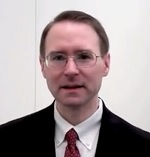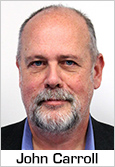 |
| NCI's James Kochenderfer |
Yesterday there was a brief, digital dust-up on Twitter over an abstract circulating online on a CAR-T study undertaken by the NCI's Dr. James Kochenderfer, one of the top scientists in the field. His team tracked remissions in 8 of 20 patients using allogeneic T cells reengineered to attack cancer. Some in the investor community interpreted the use of "allogeneic" cells as an "off-the-shelf" approach similar to what Cellectis has been at work on.
That interpretation at least temporarily upped the pressure on the stock of companies with the most advanced autologous programs, like Juno ($JUNO) and Kite ($KITE), which reengineer cells taken from each patient with chimeric antigen receptors, expand the batch and then return the altered T cells to the patient. It's been highly effective, but also limited, promising personalized therapies that are likely to be expensive to manufacture.
Hence the often raucous debate between autologous cells versus allogeneic approaches, which could have an edge in the commercial world--provided they can gain approval.
But Kochenderfer's group wasn't using "off-the-shelf" allogeneic cells. The T cells were taken from donors who participated in an allogeneic hematopoietic stem-cell transplantation. Allogeneic refers to donor cells, not taken from the patient. And while Cellectis has an off-the-shelf approach that has demonstrated early, anecdotal success, these were anything but unmatched cells.
I asked Kochenderfer to weigh in on the whole debate over autologous vs. allogeneic cells. His answer might help clarify a few things. His e-mailed response:
"If you mean use of 'off-the-shelf' non-HLA-matched donor cells, I tend to believe that use of autologous T cells is the best way to go. If the T cells are not HLA-matched, I think there will always be big problems with rejection of the T cells by the recipient's immune system. Non-HLA-matched cells can probably only achieve substantial blood levels if patients are very profoundly immunosuppressed.
"Note that at ASH I presented data that is now available online at The Journal of Clinical Oncology on an allogeneic T-cell approach, but these cells were used in the setting of allogeneic hematopoietic stem cell transplantation, and the infused cells were obtained from each patient's HLA-matched allogeneic stem cell transplant donor. The approach that I used was very different than use of other allogeneic CAR T cell approaches with unmatched 'off-the-shelf' cells.
 |
"I think the main focus of the CAR field will be autologous cells in the future because in my opinion autologous T cells will be the optimal cells to use with the best chance of undergoing extensive in vivo proliferation and the best chance of persisting long enough to eradicate malignancy."
That's not the last word on the subject, by any means. Hundreds of millions of dollars are being wagered on developing the best new CAR-Ts, and the company with the best, most efficient process can emerge as the winner in a blockbuster field. But let's define what companies and investors are betting on. -- John Carroll (email | Twitter)